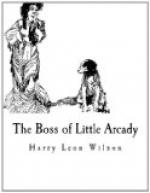“GO TO BUDD’S FOR AN UP-TO-DATE 25 CT. DINNER.”
He was obliged to limp that day, for his stone-bruise was coming on finely; but he had gone half a mile out of his way to worship at this wayside shrine. Again he was dreaming. In the days of his opulence he saw himself going to Budd’s. Fortunately for his illusions the price was now prohibitive. I had been to Budd’s myself.
“Have you ever been there?” I asked of the dreamer.
“I’ve been in his store, in the front part, where the candy is—and if you go ’round when he’s freezing ice cream, he’ll give you a whole ten-cent dish just for turning the freezer; but Pop won’t let me stay out of school to do it, and Budd don’t freeze Saturdays. But some day—” he paused. Then, with seemingly another idea:—
“He’s got an awful funny sign up over the counter.”
He would not tell me what the sign was, though, He shuffled and talked of other things. I entered Budd’s on the morrow, purposely to read it, and I knew that my namesake had quailed before it. The sign was in white, frosted letters, on a blue ground, and it ran:—
TO
TRUST IS TO BUST
TO
BUST IS HELL
NO
TRUST, NO BUST, NO HELL.
Its syllogistic hardness was repellant, but I dare say it preserved a gorgeous butterfly from utter extinction.
Home again at early twilight, we ate of a cold supper set out for us by Mrs. Sullivan. And here I reflected that good days often end badly, for my namesake betrayed extreme dissatisfaction with the food.
“Why don’t we have that pudding oftener—with lather on top of it?” was his first outbreak. And at last he felt obliged to declare bitterly, “We don’t have a thing that’s fit to eat!”
“Calvin,” said his father, “if I have to whip, it will hurt you worse than it does me.”
Whereupon the complainer was wisely silent, but later I heard him asserting, between catches of his breath, and out of his father’s hearing:—
“I don’t care—(a sniff)—when I’m rich, I’ll go to Budd’s for an up-to-date dinner, you bet—(a snuffle)—I’ll probably go there every day of my life—(two snuffles)—yes, sir—Sundays and all!”
I cheered him as best I could.
His sister had saved her day to a happy end, babbling off to bed with the distressing Irene, to whom she would show a book of pictures until sleep shut off her little eyelid.
A wise old man—I believe he was a bishop—once said he knew “that outside the real world is a world of fine fabling.”
I had stolen a day from that world. Now I hurried through the gloom of the hall, past the poor striving hands, to sit with Solon Denney and tell him of a peculiar thing I had observed during the afternoon’s walk.
CHAPTER VIII
ADVENTURE OF BILLY DURGIN, SLEUTH




